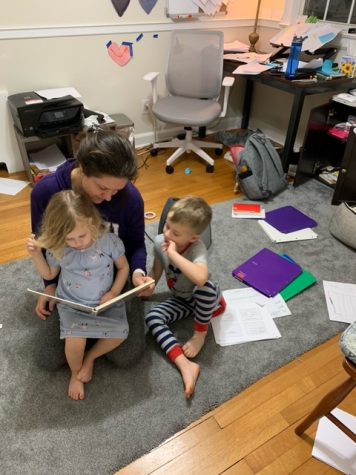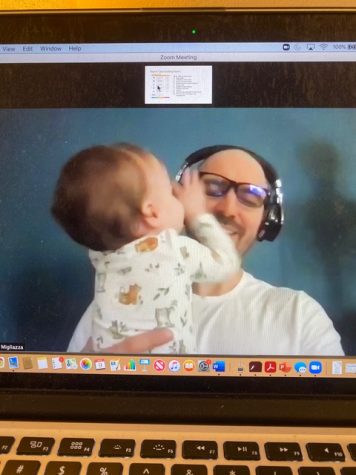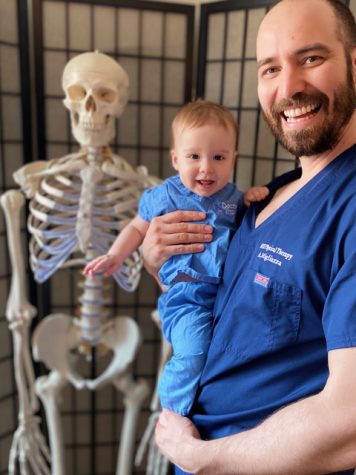With two very important roles to fulfill, student parents face a difficult balance to maintain.
Unseen, overworked, underpaid: Student parents at NYU
Struggling with burnout, hectic schedules and financial adversity, NYU’s student parents call for increased representation and resources to help them balance college and raising children.
November 8, 2021
With cutout paper hearts taped to the wall and a couple of mischievous cats climbing on her furniture, Jessica York’s Zoom background reveals a full house and a busy schedule. A third-year doctoral student in NYU’s physical therapy program, York is the mother of two young children and a student with a jam-packed schedule. York walked me through her typical Wednesday.
“The kids always wake us up,” York said. “It’s usually around 6. My husband makes breakfast for the kids while I make lunch. I grab the clothes for them and make sure their bags are packed … then I throw clothes on and head out the door.”

After commuting from New Jersey for an afternoon of consecutive classes at NYU’s Washington Square Park campus, York makes the journey back home to spend the night with her family.
“I [went] back to Penn [Station], came back home, I got home in time, I made dinner,” York said. “After we ate dinner, I sat with the kids for like 10 minutes, went upstairs, did bathtime, did bedtime … Normally, after that time, I get my studying done. So I study until I can’t keep my eyes open.”
Chauntenay Young — a third-year graduate student at NYU Wagner, NYU employee and mom of two — has a similarly hectic Wednesday schedule.
“A typical Wednesday would involve me bringing [my kids] to school … in the morning I have like an hour to get from the South Bronx, all the way down to 8th and Broadway to class,” Young said. “And then once class is finished, I work remotely for NYU, so I have to travel back up to the South Bronx.”
During months of remote classes, Arthur Migliazza, another graduate student pursuing a doctoral degree in physical therapy, remembers having to attend class and do homework in his one-bedroom apartment with his wife and infant.
“I had to do homework from the bathtub, just because it was the only quiet place I could go,” Migliazza said.
These anecdotes portray an experience unlike that of most NYU students. For student parents, the sleepless nights, bathtub study sessions and long commutes are commonplace. While most NYU students get to relax after their classes, for student parents, the end of class is just the beginning of their day.
The National Center for Education Statistics reports that over 22% of all undergraduate students are parents, a demographic that stands over four million strong nationwide. Many student parents at undergraduate and graduate levels also hold down full- or part-time jobs. On a national level, this information is easy to find. But at NYU, it takes more than a Google search.
Looking for information about NYU student parents, one is led to private chats, unanswered emails, websites untouched since 2013 and vague references to child care in New York City, which point toward digital dead ends consisting of few real people or NYU-specific resources. The first serious lead I discovered was Patrick Angiolillo, a new father and sixth-year Ph.D. candidate in the Graduate School of Arts & Science. He is also the Student Government Assembly senator-at-large for students with caregiving responsibilities, which has allowed him to conduct meaningful research and influence policy change on behalf of the student parent population via a survey published in January. The survey drew over 800 responses and was one of the first in-depth studies to paint a picture of NYU’s student parent population.
“That picture looks like graduate students commuting to campus, probably living with a partner or family,” Angiolillo said. “I think some of our respondents identified as having over four or five children [and] likely also working a job, whether that’s on campus as a student worker, a teacher, teaching assistant or off campus.”

Angiolillo added that daily commutes, child care schedules and personal responsibilities take a toll on student parents.
“Student caregivers, or student parents, especially at NYU, are just being stretched really thin,” Angiolillo said. “It’s this delicate balancing act that a lot of our student parents are playing that in any given month could mean they don’t have enough money to pay rent, or they don’t have enough money to buy groceries.”
Angiolillo became visibly emotional and paused to gather himself.
“I’m sorry, I’m not meaning to get emotional,” he said. “It’s just — it’s a really tough picture.”
This situation has only worsened during the past year and a half as the pandemic heightened existing educational disparities. However, there has been little conversation on how the pandemic impacted student parents. While York conceded that Zoom classes were at times more manageable for her than in-person classes, remote learning dissolved the barrier between work and home.
“It was really difficult emotionally to juggle so many different schedules … I would literally have no break in between for myself,” Young said. “I felt really burdened, overwhelmed. My house was just total chaos. My mind was total chaos.”
Student parents adore their families, enjoy their time at NYU and are dedicated to their coursework. But standing on this balance beam day after day, largely unsupported and unseen by your educational institution, can lead to burnout and exhaustion.
NYU’s guide of resources for student caregivers is one page long with a sizable heading. The first resource listed is a weekly counseling group that meets on Thursday afternoons, when many student parents are attending class, working or commuting. Other resources — such as parental leave and reimbursements for dependent enrollment in the student health plan — are only open to graduate employees.
The guide also lists the Center for Student Life child care subsidy, which provides a semesterly payment of $300 to full-time graduate students with children under six years old. (The subsidy was adjusted for inflation last spring after remaining at $200 since 2000.)
A 2016 report by Letitia James, who was recently appointed New York’s state attorney general, estimated that raising a child in New York City costs between $11,650 and $16,250 a year. At the very best, two semesters of NYU’s subsidy covers about 5% of the yearly cost of raising one child. It’s helpful, York said, but barely.
“On one hand, I am grateful for whatever they have to offer … On the other hand, it’s a little bit of a joke,” York said. “My first year, we were paying full-time daycare that cost over $3,300 a month. So $200 [is] like pennies to the dollar.”
Luckily, SGA and the Graduate Student Organizing Committee have made notable strides in securing financial resources for student parents. Last spring, the SGA passed a resolution that designated an officer of the Work Life Office to coordinate services for student caregivers and called for the establishment of a university-wide task force.
The GSOC child care fund for graduate student workers, which is disbursed annually to applicants, was also doubled to $200,000 in spring 2021 and is set to increase incrementally to $325,000 by 2026. Graduate employees have six-week paid leave for new births and adoptions. A new contract after the spring strike won child care benefits for GSOC graduate employees, including an annual child care subsidy and access to Bright Horizon’s child care program.
While long overdue, many of these programs are exclusive to graduate employees, graduate students or GSOC members. Undergraduate caregivers or non-employee graduate caregivers are still falling through the cracks, and graduate student employees still face myriad challenges. If NYU administration stepped up to the level of student-initiated efforts, some of the burdens on student parents could be lifted.
The struggles faced by NYU student parents aren’t solely financial — they also struggle socially. They are often unable to go out with their classmates after class, participate in study groups or attend office hours. Many students are left feeling isolated from their childless peers.
“I adore everyone, but it’s hard to connect with people when you don’t have the time to hang out,” York said. “I’m missing out on having a tight social network.”
These challenges deepen when factoring in race, gender and class.
“For the most part of my classes, I am the only mom … then to also be the only student of color, who’s also a mom, I do feel a little bit isolated … I feel like I have no voice,” Young said. “I have to still do the same as others to hold up to the expectations. But … [it’s] more challenging for me.”

These challenges are not abstract concepts — they are day-to-day struggles that require pragmatic solutions. There is no doubt that the student parent population of NYU needs to be seen and heard, but what does that look like? The first step could be to include an option to identify as a student caregiver on NYU’s personal information database. This would allow NYU to match caregivers with necessary programs and financial resources.
Student parents are advocating for more realistic subsidies paid directly to them, especially after the economic turmoil of the pandemic. Since Migliazza and his spouse lost their jobs because of the pandemic, financial support would make a huge difference.
“We’ve had to [live] off loans for quite a while,” Migliazza said. “It’d be nice if NYU had had some sort of financial help, or a work campus daycare place that was either free or affordable.”
While the implementation of on-campus child care may be pricey, Angiolillo argues that it’s worth the cost.
“It’s not outside the realm of possibilities,” Angiolillo said. “I think in the long term, on-campus child care would make NYU much more competitive.”
Campus daycares are already a cornerstone of many elite universities. On-campus child care is offered at many City University of New York campuses as well as 75% of Ivy League institutions, including Columbia University uptown. Given that the majority of mothers in college are single parents, NYU’s lack of accessible on-campus child care makes it a less feasible option for parents than other competitive institutions.
Accommodating student parents doesn’t end with administrative efforts. While many of the student parents said that they have had supportive professors, there is room for NYU faculty to widen their accommodations within the classroom. Young has struggled with securing arrangements for her needs as a mother and believes training is a solution.
“I would definitely ask that professors be trained or go through a workshop on how to deal with students who are parents,” Young said. “I have dealt with … professors who … couldn’t see my perspective on how a class could be challenging for a parent.”
Young suggested that professors be trained to provide longer breaks and create grading systems that take child care into account. Faculty training can also focus on evaluating how parenting intersects with gender, race and class. While Young said that most of her experiences with NYU faculty have been positive, she recounted an experience at an NYU interview where her academic capability as a mother was brought into question.
“One question was, ‘How do you think you can handle this as a parent?’” Young said. “I just wanted to say, ‘Would you have asked this if I were a dad?’ This is not an accident. I planned my life around this. I planned my pregnancies around this.”
This lack of understanding doesn’t only do a disservice to student parents — it also spells a heavy loss for NYU. Student parents bring maturity, admirable determination and valuable perspectives to the classroom. With so few resources for student parents, how many scholars is NYU turning away simply because they can’t afford or schedule child care? How many conversations haven’t been had, papers haven’t been written or studies haven’t been conducted? How many potential students have been altogether dissuaded from applying to NYU because of their parental status?
But with the work of groups such as SGA and GSOC, the experience of student parents has moved from an invisible field to an active work in progress. With more representation and resources from the community, there is hope for the future of student parents at NYU.

The introduction of Angiolillo’s Student Caregivers Network and corresponding newsletter is an important first step in bringing visibility to the experience of student parents. York spoke about the feeling of isolation she experienced before being introduced to the Caregivers Network.
“You just get so used to expecting so little, as a parent, from work or from us being as a student,” York said. “When I got the [child care newsletter email], I was thrilled to see that there was some representation. I just feel invisible. I picked this journey, and I’m fine with that. But sometimes it’s like internal screaming … We’d all get mass emails last year about COVID, [saying] ‘Well, some of the faculty are being affected by child care’ and … what about the students? We are also being affected by this and no one seems to care.”
The fact that many of NYU’s brightest scholars are unseen, underpaid and overworked due to their role as parents should be a call to action. One of NYU’s greatest strengths is diversity, and to maintain this strength NYU must allocate resources to disenfranchised groups like student parents.
These days, though, a long day struggling with classes, work and child care — with minimal support from NYU — is just another Wednesday for student parents like Jessica York and Chauntenay Young.
Being a student parent should not be a lonely journey. It can be a path as well-lit as Broadway, as much a part of NYU as West 4th Street.
“We’re here,” Angiolillo said, “and we deserve to be noticed.”
Students interested in learning more about the experience of student parents can contact Patrick Angiolillo at [email protected], GSOC at [email protected] or sign up for Angiolillo’s monthly Caregivers Network Newsletter.
A version of this story appeared in the Nov. 8, 2021, e-print edition. Contact Ava Emilione at [email protected].

